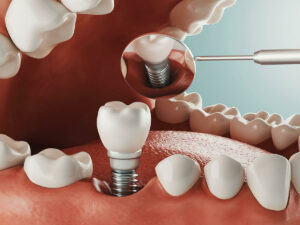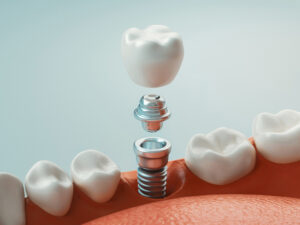Dental Implants
Dental implants are a very reliable source for effective tooth replacement. Whether you have lost one tooth or many, implants can provide a permanent solution that looks and functions normally.
Dental Implants in Winter Springs, FL
Dental implants are special posts of titanium alloy that are surgically placed into the jawbone. This can be done to replace individual missing teeth and partial dentures or to support full all-on-4 implants. These posts act as an artificial root for a crown when they are used to replace individual teeth. Dental implants stabilize bone levels and can prevent bone loss, resulting in better long-term support, function, and aesthetics.
Dental implants require less adjustment or shaving of surrounding teeth than other restoration methods, such as dental bridges. They are more flexible and provide a more natural feeling than dental bridges and partial or full dentures.
Call Collins Dental

How Much Do Dental Implants Cost?
We aim to provide high-quality dental care that’s affordable for our patients in Winter Springs, FL. The cost of dental implants varies, depending on the crown, abutment, and the implant itself. Below is our price range, per implant. Out-of-pocket costs for any procedure depend on your insurance coverage at the time of the procedure.
- Dental Implants: $1,636 – $4,255
- Includes 3-D x-ray
Certain PPO plans may cover up to 50%
See All Office FeesDental Implant Process at Collins Dental
- Consultation & Exam. To decide if dental implants are the right restoration method for you, we will conduct a full exam, including taking a 3D scan for placement planning, discussing your surgical guide for placement, and your overall treatment options.
- Tooth Extraction & Bone Grafting. If teeth require extraction, the procedure will be scheduled once a treatment plan is established. This will also require some recovery time to ensure the site is ready for the implant procedure. Any bone grafting necessary to support the implant will then occur, requiring at least a few months to heal.
- Implant placement. Once the site is ready, the implantation can take place. The implant will be placed into the jawbone, and a healing cap will be placed over the implant. This is followed by regular check-ups to ensure proper healing.
- Implant healing. After your implant is placed, osseointegration begins. During this, your jawbone heals around the dental implant, providing a solid base for your new artificial tooth. This process takes approximately 3 months.
- Abutment & Crown Placement. Once healing is complete, the abutment, connecting piece, and a replacement tooth, or crown, can be placed.
-
What types of dental implants exist?
Two of the most commonly used dental implants are endosteal implants and all-on-4 implants. Endosteal implants are the most common dental implant option. They are comprised of a titanium metal rod that is installed into the jawbone and a supporting post that is specifically designed to secure either a dental crown or a dental bridge. All-on-4 implants are a revolutionary dental implant system in which an entire top or bottom denture is supported on just four implants. Each implant is strategically placed so the replacement teeth remain steady and secure. The advantage of using four implants is that it helps promote faster patient recovery and reduces the likelihood of complications from possible implant failure.
-
Are there any aftercare instructions for dental implants?
Immediately after dental implant placement, you should be careful not to disturb the placement site. This means no chewing near the implant. It also requires careful cleaning several weeks to a month after placement. The dental implant takes several months to fuse to the jaw, so the fewer disturbances during that period, the better. If you have a temporary denture to replace your missing dentition, the denture must not rub on the surgical site.
After implantation and extraction or grafting, if required, you may experience typical discomforts associated with any oral surgery. These can include swelling, pain at the site, and minor bleeding. Below are some specific recommendations for the first two weeks after any procedure during this process to ensure proper healing and recovery.
- Pain Management. Ibuprofen reduces pain and swelling and is highly recommended after surgery.
- Oral Hygiene. Gentle brushing is important to keep the recovering area clean and to avoid irritation from overly aggressive brushing. Warm salt water rinses can also help keep the area clean and reduce pain and swelling.
- Minor Bleeding. After oral surgeries, it’s common to have a small amount of blood in your saliva for a day or two. Gently biting on a gauze pad for 30 minutes can help with this. If bleeding continues for more than a few days, contact our office.
- Swelling. Besides ibuprofen and saltwater rinses, periodically using an ice pack on the cheek near the affected area can help.
Dental Implant Aftercare -
What are the benefits of dental implants?
A person suffering from tooth loss will experience many challenges. The most obvious of these challenges are difficulties when chewing and speaking clearly. When tooth loss is left untreated, it can result in severe problems like tooth shifts, jawbone deterioration, facial structure loss, and bite imbalances. These issues usually develop over time when there is no root system to maintain bone health and alignment. Dental implants provide an artificial root system to maintain order and keep the remaining teeth in line.
They can not only help a patient overcome short-term challenges; they can also prevent long-term problems linked to tooth loss. They are the most effective method for treating tooth loss because dental implants serve as an artificial root system for supporting a prosthetic tooth and allow replacement teeth to feel more natural.
-
How long do dental implants last?
Dental implants themselves are meant to last a lifetime. The post will fuse with your jawbone and should never require replacement or further intervention unless rare complications occur. Dental crowns, or the artificial tooth itself, that is attached to the dental implant can have a lifetime of between 10 and 30 years. Dental crowns require the same care as normal teeth. With twice-a-day brushing, flossing, and regular dental checkups, the lifespan of your crown can increase greatly.
Dental implants are a very safe and effective type of restoration dentistry. However, there is a small chance that the dental implant will fail to integrate with the jawbone after implantation and must be removed. Certain medical conditions can put you at a higher risk for implant failure. As with any surgery, there is a potential risk of surgical complications when placing a dental implant.
Questions About Dental Implants?
If you have any questions about dental implants or need a consultation, please schedule an appointment using the link below. We also provide numerous other restorative, preventative, and cosmetic dental services, see all of them by clicking See All Dental Services.
